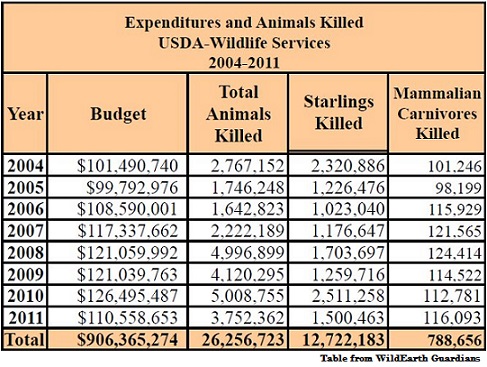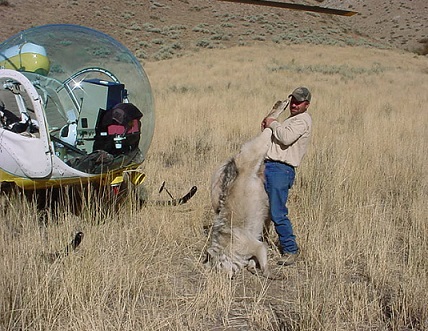Editorial: Rein in Wildlife Services
Deficit hawks in Congress ought to take notice of Rep. Peter DeFazio’s description of Wildlife Services as having one of the “least detailed budgets of any federal agency.” If the agency received the scrutiny DeFazio and Rep. John Campbell, R-Calif., are seeking, Congress might discover what critics have been saying for decades: This low-profile arm of the U.S. Agriculture Department wastes money killing wildlife, with no demonstrable benefits for the public or the environment.
 Wildlife Services was created in 1886, and the mindset that guides its work remains rooted in the 19th century: To protect livestock and big game, populations of predators such as coyotes, wolves, bears and cougars must be suppressed. The arsenal at the agency’s disposal, however, has expanded beyond traps and rifles to include a variety of poisons. All of the methods of killing predators result in the death or injury of many animals that are not targeted, including endangered species, pets and humans.
Wildlife Services was created in 1886, and the mindset that guides its work remains rooted in the 19th century: To protect livestock and big game, populations of predators such as coyotes, wolves, bears and cougars must be suppressed. The arsenal at the agency’s disposal, however, has expanded beyond traps and rifles to include a variety of poisons. All of the methods of killing predators result in the death or injury of many animals that are not targeted, including endangered species, pets and humans.
In this era of austerity, the budgetary angle may offer the best inducement for Congress to take a close look at the $60 million the federal government spends on Wildlife Services each year. Nothing else has worked. In 1964 a panel of scientists said in a report to the U.S. Department of the Interior that the agency “no longer is a balanced component of an overall scheme of wildlife husbandry and management.” Nothing happened. In 1971, following another critical review, President Nixon banned the agency’s use of poisons. President Ford rescinded the ban.
The agency’s imperviousness to reform is a testament to the political power of ranchers and big-game hunters, but a 2012 letter from the American Society of Mammologists to the bureaucratic parent of Wildlife Services, the USDA Animal and Plant Health Inspection Service, might cause even those interests to reconsider their position.
The letter notes that the number of animals killed each year by Wildlife Services is “remarkably consistent”: between 72,000 and 90,000 coyotes, for instance, and between 2,000 and 3,000 red foxes. “The consistency of these numbers, year after year, implies either that the killing is creating biological sinks that quickly fill, or that reproduction is compensating for the increased mortality.” Either way, neither ranchers nor hunters are getting the desired benefit.
 Taxpayers certainly are not. The mammologists’ letter notes that “it is estimated that at least five taxpayer dollars are expended to kill every coyote that is deemed responsible for the loss of one dollar’s worth of livestock, and this figure does not count the damage to the range and lost forage for livestock caused by any compensatory increases in jackrabbits when coyotes are removed.”
Taxpayers certainly are not. The mammologists’ letter notes that “it is estimated that at least five taxpayer dollars are expended to kill every coyote that is deemed responsible for the loss of one dollar’s worth of livestock, and this figure does not count the damage to the range and lost forage for livestock caused by any compensatory increases in jackrabbits when coyotes are removed.”
This criticism points to the larger problem of Wildlife Services’ approach: The animals targeted by the agency serve important ecological purposes. When wolves or coyotes are suppressed, jackrabbit populations boom. When prairie dog colonies are exterminated, black-footed ferrets lose their prey and trigger costly recovery plans under the Endangered Species Act.
DeFazio and Campbell are calling for hearings on Wildlife Services’ activities, and have asked the USDA’s inspector general to investigate the agency. That’s the least Congress and the department should do.
This editorial is from the Register Guard.
***********************************************************************************************************************************************************
Please write a letter to the editor today, thanking the Register Guard for this editorial and calling for an end to the wasteful, brutal practices of Wildlife Services. The letters to the editor page is one of the most widely read, influential parts of the newspaper. One letter from you can reach thousands of people and will also likely be read by decision-makers.
Some suggested points to include are below, but please write in your own words, from your own experience. Start by thanking the paper for the editorial.
- We should all join contact our members of Congress and join Congressmen Campbell and DeFazio in calling for further investigation into, and changes to, the operations of Wildlife Services.
- It is unacceptable for a federal agency to engage in the wholesale slaughter of animals, including endangered species and pets. The two million animals killed since 2000 include more than 50,000 non-target animals, including family pets and federally protected golden eagles, killed with indiscriminate tools such as traps, snares and poison.
- This program carries an enormous expense for taxpayers, destroys our nation’s wildlife, and disrupts the balance of our wild lands. Currently, Wildlife Services spends over $100 million annually to kill more than one million animals.
- The US Department of Agriculture’s own statistics show that most livestock losses come from weather, disease, illness, and birthing problems, not predation. Despite this, Wildlife Services continues to “preventatively” kill more than 100,000 native carnivores each year, even when the effectiveness of such killing is counterproductive.
- Wildlife Services can and should immediately end one of the cruelest, most hazardous and environmentally harmful killing methods— the use of two deadly predator poisons, Compound 1080 and sodium cyanide M-44 devices.
- A range of proven-effective nonlethal deterrence methods and assistance with their implementation are available to livestock businesses. These are infinitely preferable to the wholesale slaughter of native carnivores that is impacting entire ecosystems.
Your letter should be no longer than 250 words, should refer to the editorial, and must include your name, address and phone number. Letters can be submitted by e-mailing: rgletters@registerguard.com.
___________________________________________________________________________________________________________________________________________________________________________
Click here to join our email list for Mexican gray wolf updates and action alerts.
Visit us on Facebook here.



